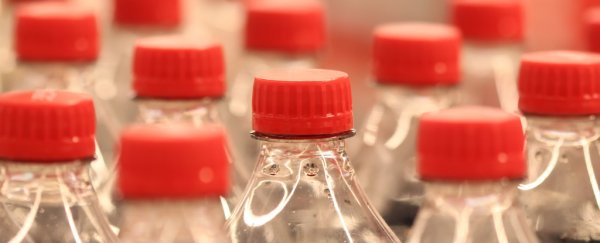On one day in September, people from over 50 countries decided to do something about our plastic problem.
Together, they picked up almost half a million pieces of plastic garbage littering the planet. Over 40 percent of this mountain of trash was still clearly identifiable by brand, and one producer's trash in particular was picked up much more than any other: Coca-Cola.
An audit of the 476,423 pieces of plastic waste picked up by over 70,000 volunteers on World Clean Up Day suggests that Coca-Cola is the world's biggest plastic polluter, responsible for 11,732 of the pieces of plastic trash retrieved during the global event.
That's a lot of strewn plastic waste produced by just one company - more than double the amount from the global runner-up (Nestlé, 4,846 pieces), then Pepsi (3,362), with Mondelēz, Unilever, and Mars being among others making up the rest of the top 10.
It's actually the second year in a row that Coca-Cola has come out on top (or at the bottom, rather, given how ignominious these rankings are), according to the researchers behind the audit, environmentalist movement Break Free From Plastic (BFFP).
"This report provides more evidence that corporations urgently need to do more to address the plastic pollution crisis they've created," says BFFP global coordinator Von Hernandez.
"Their continued reliance on single-use plastic packaging translates to pumping more throwaway plastic into the environment. Recycling is not going to solve this problem."
For decades, people in many countries looked at recycling as an environmentally responsible fix for our waste production, but a recent breakdown in the system – triggered by China's refusal in 2018 to accept waste imports – has led to a recycling and trash crisis in the US and elsewhere.
The breakdown has also helped to raise awareness of how recycling processes actually operate (or don't).
For plastic, which comes in many different chemical forms that can be difficult, impractical, or inefficient to repurpose, recycling is particularly problematic, which is why the BFFP says an urgent reduction to global plastic production is the only real answer to the crisis.
"Of the total amount of plastic produced since the 1950s, only 9 percent has actually been recycled globally, with the rest being burned, landfilled or left polluting our environment," the BFFP authors explain in their report on the world's worst plastic polluters.
"Recycling is not the magic solution it is often claimed to be… companies that are claiming it is the solution are simply avoiding making real change."
For consumers, the complexity of the issue can be difficult to see, especially when companies like Coca-Cola spend millions on recycling and 'zero waste' initiatives that on the surface seem environmentally responsible, even pledging last year to collect and recycle the equivalent of every bottle or can it sells globally by 2030.
According to critics, those gestures are just a distraction – an attempt to portray the company as a responsible, sustainability-focused brand – all the while ensuring that bottle production in the background remains undisturbed.
"Recent commitments by corporations like Coca-Cola, Nestlé, and PepsiCo to address the crisis unfortunately continue to rely on false solutions," says Greenpeace Southeast Asia plastic campaign coordinator Abigail Aguilar.
"These strategies largely protect the outdated throwaway business model that caused the plastic pollution crisis, and will do nothing to prevent these brands from being named the top polluters again in the future."
For Coca-Cola, the clear messaging in public is that plastic waste in the environment is "unacceptable", but plastic manufacturing itself is another thing entirely – and one that isn't going away anytime soon.
"There are plenty of people out there in the world who would like to see plastic go away. We know that's not going to happen," Coca-Cola's senior director of environmental policy, Ben Jordan, told the audience at a plastic engineering conference held in Atlanta last month.
"We know there are all sorts of benefits to plastic. We're all going to be using plastic for years and years, right?"
The report is available from the Break Free From Plastic website.
